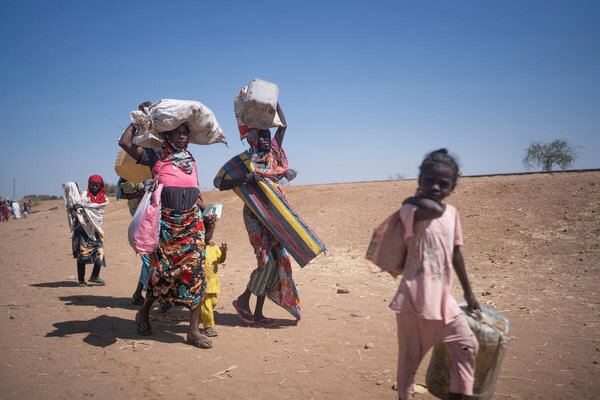Economic fallout of Sudan war deepens hunger crisis for millions

In Sudan, areas of agricultural land have turned into battlegrounds, while farms and businesses stand abandoned as people have fled for safety. There are huge cash shortages nationwide, and repeated cuts to communication channels hinder efforts to keep commerce going. Food prices in Sudan are 73 percent higher than last year and 350 percent above the five-year averages, exacerbated by the currency's devaluation. The ripple effects are felt in South Sudan and Chad where disrupted trade and massive population displacements are straining resources and intensifying hunger.
“Millions of people in Sudan, South Sudan and Chad are being threatened by starvation because this war has laid waste to agriculture, businesses and national economies – leaving its victims hungry and penniless,” said WFP’s Executive Director Cindy McCain. “The fighting must stop now, or the region may soon become the world’s largest hunger crisis.”
The lean season in Sudan is just around the corner. It is starting earlier and expected to run for longer because the war has severely limited the last harvest season. A crop assessment conducted by FAO shows national cereal production at 46 percent below 2023 levels and 40 percent below the five-year average as the conflict has destroyed swathes of farmland, both directly as well as indirectly by forcing farmers from their land. Meanwhile, fertilizers and fuel have become unaffordable for those farmers who can still tend their fields.
Sudan will be unable to finance the import of sufficient food stocks to cover the shortfall. Last year alone, the price of staple grains doubled and is expected to rise further because of the latest poor harvest. This will lead to even more severe food shortages during the lean season, with a devastating impact for the millions of people who are already struggling with record levels of hunger, disease, and malnutrition
South Sudan’s economy is plummeting as families grapple with hyperinflation and extreme currency depreciation, driven in part by a rupture in the country’s main oil export pipeline that runs through Sudan in March. Oil is the main source of revenue for South Sudan. Meanwhile, cross-border trade from Sudan – a lifeline for landlocked South Sudan – has come close to a standstill since the onset of the war.
This economic turmoil risks pushing one million people into severe food insecurity in South Sudan, where already over half the population – 7.1 million people – are acutely hungry, new modelling from WFP shows. Food prices have more than doubled in some areas and around four in five households in South Sudan may be unable to afford food essentials.
A similar scenario is playing out in Chad, where food prices in the east have nearly doubled in the last year. Border closures have severely restricted trade and the availability of food in the markets. Nearly half of all refugees and returnees in eastern Chad are facing acute hunger as the lean season approaches.
With fighting only intensifying, the trajectory of Sudan’s war remains deeply alarming: it will trigger the world’s largest hunger emergency as the impacts of the conflict reverberating around the entire region There are 28 million already food insecure people across Sudan, South Sudan, and Chad who will slip into even deeper and more severe levels of hunger.
Note to Editors:
High resolution photos available here
Topics
Sudan South Sudan Chad EmergenciesContact
Leni Kinzli, WFP/Sudan, Mob. +254 769 602340
Gemma Snowdon, WFP/Juba, Mob. +211 92 543 0085
Deborah Nguyen, WFP/Nairobi, Mob. +254 734554021
Annabel Symington, WFP/ Rome, Mob. +39 188 4921
Nina Valente, WFP/ London, Mob. +44 (0)796 8008 474
Martin Rentsch, WFP/Berlin, Mob +49 160 99 26 17 30
Shaza Moghraby, WFP/New York, Mob. + 1 929 289 9867
Steve Taravella, WFP/ Washington, Mob. +1 202 770 5993
Thida Ith, WFP/ Ottawa, Mob. +1 613 608 2587
